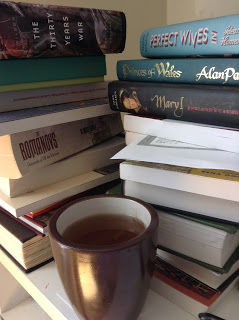I am Carolyn Harris and This is How I Work
 Today, I am interviewing Carolyn Harris for the “How I Work” series. Carolyn completed her PhD in European history at Queen’s University at Kingston, Canada in 2012. She is an instructor in history at the University of Toronto School of Continuing Studies and the author of three books, Magna Carta and Its Gifts to Canada (Dundurn, 2015), Queenship and Revolution in Early Modern Europe: Henrietta Maria and Marie Antoinette, (Palgrave Macmillan, 2015) and Raising Royalty: 1000 Years of Royal Parenting (Dundurn Press, 2017). Magna Carta and Its Gifts to Canada spent a week on the Globe and Mail Canadian non-fiction bestseller list and Queenship and Revolution in Early Modern Europe received the 2016 Royal Studies Network book award for best book on the history of monarchy. Her writing concerning history and royalty has appeared in a variety of publications including The Globe and Mail, National Post and Ottawa Citizen newspapers, BBC News, Canada’s History and Smithsonian magazines and she frequently provides royal commentary for TV and radio. She is a contributor to a variety of public history projects including Magna Carta Canada and The Canadian Encyclopedia and provide guest lectures for a variety of venues including libraries, museums and cruise ships. She blogs about history and royalty at royalhistorian.com.
Today, I am interviewing Carolyn Harris for the “How I Work” series. Carolyn completed her PhD in European history at Queen’s University at Kingston, Canada in 2012. She is an instructor in history at the University of Toronto School of Continuing Studies and the author of three books, Magna Carta and Its Gifts to Canada (Dundurn, 2015), Queenship and Revolution in Early Modern Europe: Henrietta Maria and Marie Antoinette, (Palgrave Macmillan, 2015) and Raising Royalty: 1000 Years of Royal Parenting (Dundurn Press, 2017). Magna Carta and Its Gifts to Canada spent a week on the Globe and Mail Canadian non-fiction bestseller list and Queenship and Revolution in Early Modern Europe received the 2016 Royal Studies Network book award for best book on the history of monarchy. Her writing concerning history and royalty has appeared in a variety of publications including The Globe and Mail, National Post and Ottawa Citizen newspapers, BBC News, Canada’s History and Smithsonian magazines and she frequently provides royal commentary for TV and radio. She is a contributor to a variety of public history projects including Magna Carta Canada and The Canadian Encyclopedia and provide guest lectures for a variety of venues including libraries, museums and cruise ships. She blogs about history and royalty at royalhistorian.com.
Current Job: Historian and Author
Current Location: Toronto
Current mobile device: Alcatel One Touch 6040A (Android)
Current computer: ASUS Zenbook UX305C
Can you briefly explain your current situation and research to us?
I am currently researching and writing my 3rd book Raising Royalty: 1000 Years of Royal Parenting, which will be published by Dundurn Press in the Spring of 2017. I recently finished teaching a course about Imperial Spain at the University of Toronto, School of Continuing Studies and will be teaching another course, Richard III: Monstrous or Misunderstood? in the fall of 2016.
What tools, apps and software are essential to your workflow?
I use Microsoft Word for writing projects. I have found Word to be a useful tool for developing articles and book chapters but it is less effective for whole book manuscripts and I am researching alternatives for future book projects.
I use a WordPress platform for my website royalhistorian.com and publicize my writing on a variety of social media platforms including Twitter, LinkedIn, Facebook and Goodreads.
What does your workspace setup look like?
I do most of my writing and teaching preparation in the home office. I have a compact white desk, lots of bookcases and a laser printer. There is a laser printer/scanner on top of my filing cabinet, which is especially useful for scanning signed contracts and invoices for freelance work. When I am working on a book project, the desk is often piled high with books and other research materials.
What is your best advice for productive academic work?
My best advice would be to structure the workday around tasks completed rather than hours. Every day, I set particular tasks to complete. As I am currently working on a book manuscript, my weekday tasks include writing a certain number of words per day. This approach allows for flexibility concerning when the work is completed and provides motivation for working efficiently.
How do you keep an overview of projects and tasks?
For tracking my freelance writing projects and invoices, I use Microsoft Excel spreadsheets, organized by month and year. I have columns listing the date, sponsoring organization, fee and description for each project, accompanied by columns labeled “Submitted?” “Published?” “Invoiced?” and “Paid?” This system allows me to easily track my deadlines and follow up on late payments.
Besides phone and computer, do you use other technological tools in work and daily life?
I have an iPod touch that I use for listening to music and podcasts. There are number of podcasts that I particularly enjoy including This American Life, BBC World Service documentaries, Great Lives and In Our Time.
Which skill makes you stand out as an academic?
My ability to write and lecture about a variety of different topics related to my expertise. PhDs often encourage narrow specialization but my dissertation compared the role of the queen during the English Civil Wars and French Revolution, events that took place in different countries during different centuries. I have applied my interest in the role of women in royal courts to a variety of academic and popular writing projects. For example, I wrote an article about “The Political Significance of Grand Duchess Olga Nicholaevna (1895-1918)” for Canadian Slavonic Papers in 2012 and a chapter about Queen Victoria’s daughter Princess Louise and her time in Canada entitled “Royalty at Rideau Hall” for a book about Canada and the Crown.
What do you listen to when you work?
Lots of different types of music. When I’m writing, I enjoy folk rock. I listen to a lot of Gordon Lightfoot and Cat Stevens.
What are you currently reading? How do you find time for reading?
In addition to history books related to my research, writing and teaching, I like to have a novel and a work of non-fiction (such as a popular history, biography or travel book) on the go at all times. I am currently reading Louis de Bernières’s historical novel about the First World War, The Dust That Falls from Dreams and David McCullough’s history of the construction of the Panama Canal, The Path Between The Seas. I often read in the evenings or while commuting on public transit to lectures.
Are you more of an introvert or extrovert? How does this influence your working habits?
According to the quiz in Susan Cain’s book, Quiet: The Power of Introverts in a World That Can’t Stop Talking, I am an ambivert, a personality type that includes both extrovert and introvert qualities. I am happy both spending long hours in solitude research and writing a book manuscript and traveling to museums, libraries and bookstores to sign books and meet with readers.
What’s your sleep routine like?
My sleep routine is highly variable depending on my work schedule. For example, I recently provided historical commentary for the Canadian Broadcasting Corporation (CBC) News Channel and the CTV News Channel about the celebrations for Queen Elizabeth II’s 90th birthday in April and June 2016. On those days, I woke up at 4:30am in order to be in the studio by 6am. In contrast, when I gave lectures at Fort York in Toronto about Magna Carta in the fall of 2015, my talks were at 2pm and 8pm so I slept later in the mornings to ensure that I was energetic for public speaking and book signing in the evenings.
What’s your work routine like?
I start by making tea. If I am working from home, I sip different types of loose leaf tea all day while writing. I’ve accumulated quite a collection of different black, green, white, rooibos and herbal teas. Then, I take care of e-mail and publicizing newly published articles on social media. I spend most of the day writing or preparing for teaching. I also travel to give guest lectures. I try to restrict writing/teaching preparation to weekdays but that’s not always possible if I have a lot of deadlines around the same time.
What’s the best advice you ever received?
Seize the opportunities that come your way! Since completing my PhD in 2012, my career has gone in unexpected and interesting directions. I have had the opportunity to contribute expertise to the media, write books, travel across Canada on a cross-country book tour promoting my first book, Magna Carta and Its Gifts to Canada, and give history lectures on cruise ships sailing around Europe and across the Atlantic Ocean.


Thanks my dear Carolyn Harris for your excellent writing professional informative educational inspirational article, all about what are important about your Resume , You are an amazing personal have a wonderful ideas and initiativesI'm in the scientist in the area of the biotechnology and its applications in the pharmaceutical industryAcademy professor in the same areaAuthor in all humanitiesPoet I have about 300 published poem in the area of love and emotional feelings and relationsProf.Dr.SAYED ATALLA